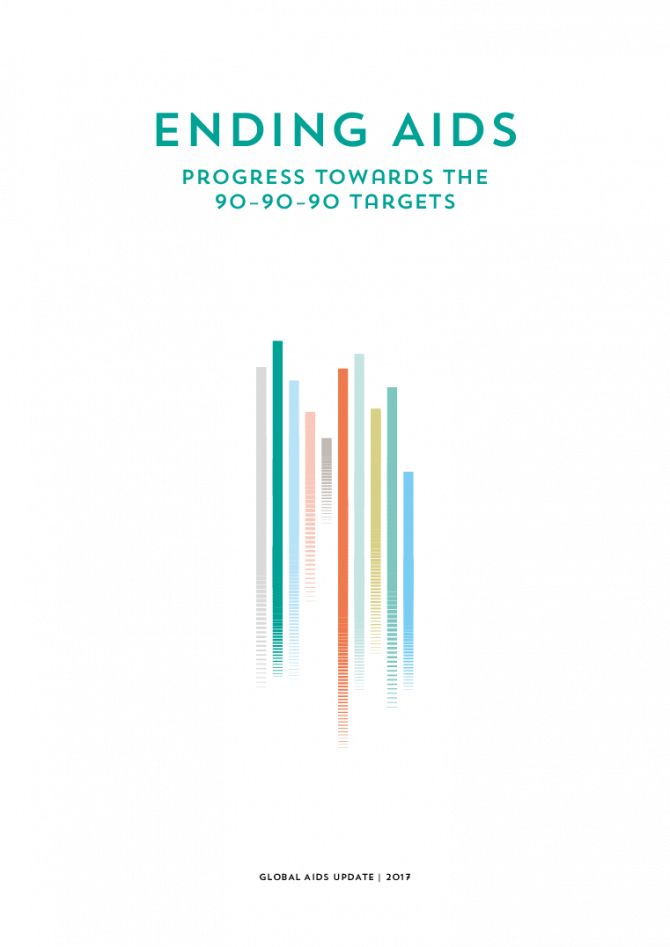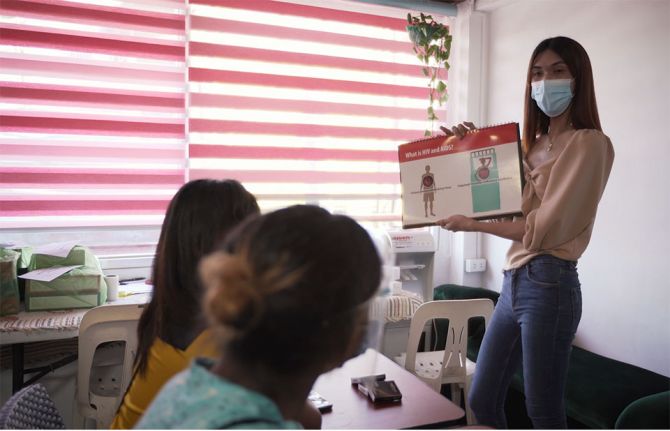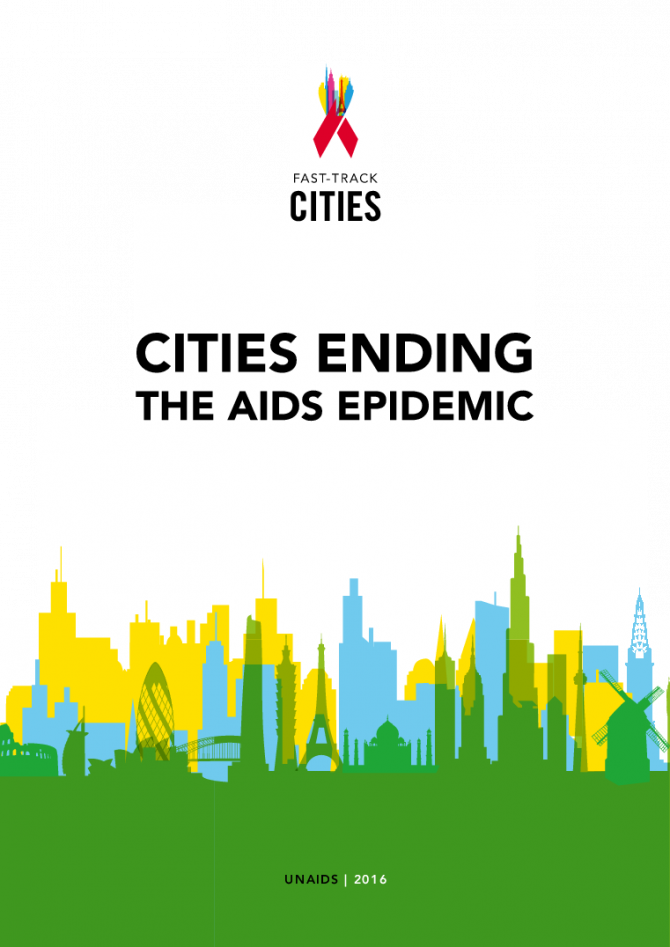
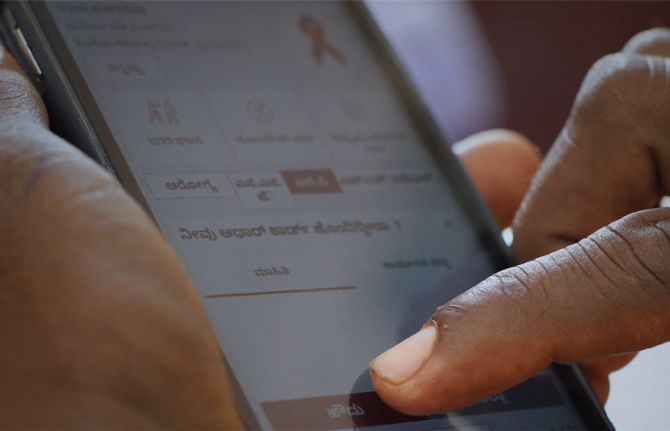
Feature Story
Mobile phones provide massive potential to move towards e-health systems
26 April 2018
26 April 2018 26 April 2018Shiv Kumar, from Swasti Health Catalyst in India, decided to build a mobile and web application called Taaras (rapid progress). He had watched peer educators work with sex workers in Bangalore, India, and realized that he could make their jobs a lot simpler and more efficient. The south-east Indian city has become a major hub and, as a result, the population has boomed, as have sex workers.
After seeing outreach workers, mostly former sex workers, lugging notebooks and jotting down information and recalling appointments and treatment pickups, he created an app that helps with data collection. “Icons and swipes allow outreach workers to enter all sorts of stuff and swipe and pick up where they left off,” Mr Kumar said. They can also text multiple recipients with reminders and invitations.
“Outreach can no longer be a one-way street. You have to engage the patient,” he said.
The app rolled out in five Indian states in English as well as four regional languages. Since its debut in March 2016, there are now more than 400 users following about 120 000 sex workers.
Bangalore outreach worker Natranity said that she has a lot less paperwork to deal with. “All the data of a particular person is now in one place, versus five or six registers that I had to consult,” she said. Her colleague, Abdul, agreed, “I see about 10 to 15 people a day and what saves me a lot of time is not asking the same questions over and over again, because I can consult their profile.”
The phones had their limits, they explained. “At the initial stage, it’s important to build trust to avoid any discomfort in case they think we are taking photos or recording them,” Natranity said.
Prachi Patel, a technology developer at Swasti, sees Taaras as a bridge to an overall solution. “The app is a helper; outreach workers still do all the talking,” she said. A by-product of the app has been higher engagement with sex workers and an increase in reporting incidents of violence. For confidentiality, the app has a stress password that scrambles the data in the event that someone tries to access the information.
UNAIDS Senior Adviser Philippe Lepère commends such efforts and believes e-health has a huge potential. Not only can it strengthen health systems, it also empowers people to manage their own care. Referring to the World Health Organization’s Guidelines on the use of antiretroviral drugs for treating and preventing HIV infection: recommendations for a public health approach, he said that they advocate using text messages to remind people to take their treatment and encourage newly diagnosed people to seek out services.
For this to work, however, he stressed the importance of confidentiality and respect of the user. “Receiving an HIV-related SMS can have drastic consequences in some communities,” he explained. That's why, he said, the content and the frequency have to be ironed out beforehand. “Most importantly, it’s urgent to shift from pilot studies to a larger implementation of programmes at a sufficient scale that can then be integrated within health systems,” Mr Lepère said.
“In certain countries, digital apps have flooded the market and the government has no way of accessing the data or doing any quality control,” he said.
Hani Eskandar, from the International Telecommunications Union, definitely sees mobile phones as paving the way towards universal health coverage.
But, in his view, e-health systems are far from a reality. “Countries have not yet grasped the benefits of this, because they are still focused on vaccines and building hospitals rather than outreach,” he said. He is pushing for governments to rebuild infrastructures that integrate digital platforms.
“It's simple,” he said. “We need for mentalities to change at all levels and stop thinking that the phone is just a gadget.”

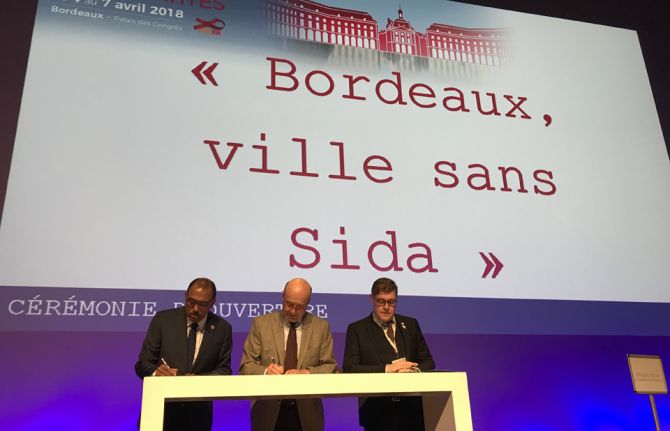
Update
Bordeaux signs Paris Declaration to end the AIDS epidemic in cities
05 April 2018
05 April 2018 05 April 2018On 4 April, Bordeaux became the latest city to sign up to the Paris Declaration to end the AIDS epidemic in cities. The Mayor of Bordeaux and former French Prime Minister Alain Juppé signed the declaration alongside UNAIDS Executive Director Michel Sidibé at the opening of AFRAVIH, the international francophone HIV and hepatitis conference being held in Bordeaux, France, from 4 to 7 April.
In signing the Paris Declaration, mayors commit to putting their cities on the Fast-Track to ending the AIDS epidemic. Mr Juppé committed to achieving the 90–90–90 targets—whereby 90% of people living with HIV know their HIV status, 90% of people who know their HIV-positive status are accessing treatment and 90% of people on treatment have suppressed viral loads—in Bordeaux in the next two years. He also committed to eliminating stigma and discrimination and developing a people-centred approach to the AIDS response. In addition, he said, it was crucial to educate young people on HIV, citing a lack of knowledge among French young people.
Since its launch on 1 December 2014, more than 250 cities and municipalities have signed the Paris Declaration. Leaders in those cities have recognized that their strategies for responding to the AIDS epidemic also offer them a platform to address the need for social inclusion, protection, safety and health.
With more than half of the world’s population currently living in cities and urban areas accounting for a large and growing proportion of people living with HIV, tuberculosis (TB) and other diseases, cities will play an essential role in ending AIDS. The risk of contracting, and vulnerability to, HIV and TB is often higher in urban areas compared to rural areas, owing to a number of reasons, including migration, unemployment and social and economic inequalities.
The AFRAVIH conference will focus on the 90–90–90 targets as well as innovations on HIV treatment and prevention and on scientific advances.
Quotes
“By signing this declaration, we commit to ensure that services are delivered to everyone in an equitable and efficient way. It’s not just HIV that is at stake, it’s a question of health overall.”
“We must push for further integration of health services and put fragile communities at the centre of our efforts. This is the way to build resilient communities and cities worldwide.”
“Regardless of whether Bamako is ahead of Bordeaux since we signed the Paris Declaration ahead of Bordeaux, our priority remains the same: HIV prevention and patient care so that we can eliminate AIDS.”
Region/country
Documents
2017 Global AIDS update - Ending AIDS: progress towards the 90–90–90 targets
20 July 2017
This report clearly demonstrates the power of the 90–90–90 targets and what can be achieved in a short time. It shows that innovations are possible at every level—from communities to research laboratories, from villages to cities. It illustrates the power of political leadership to make the impossible possible.

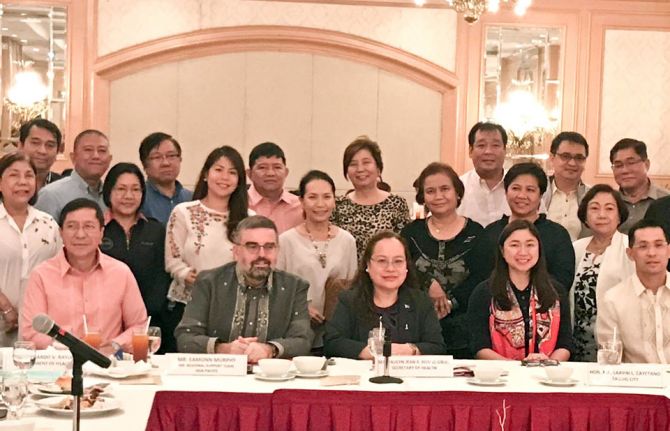
Update
Metro Manila city leaders commit to intensifying HIV response
11 September 2017
11 September 2017 11 September 2017Mayors and other city leaders from the 17 cities that make up the National Capital Region in the Philippines pledged to make the HIV epidemic a public health emergency requiring multisectoral strategies and a full provision of resources. The city representatives recently signed a city HIV resolution during a dinner meeting in Manila hosted by the Secretary of the Department of Health, Paulyn Jean Rosell-Ubial.
A recent UNAIDS report, Ending AIDS: progress towards the 90–90–90 targets, has helped to galvanize this action. The report found that the number of new HIV infections in the Philippines has risen by 140% in the past six years and the country has the fastest growing HIV epidemic in the Asia and the Pacific region. Health authorities say that the 17 cities in the National Capital Region accounted for more than 40% of reported HIV cases in the country.
Ms Rosell-Ubial stated that she had raised this alarm as early as last year, when she took office, calling the situation a national emergency. She appealed to the mayors and city officials of Metro Manila for their help in delivering crucial services to community groups and key populations. The Mayor of Taquig City and Chair of the League of Cities, Laarni “Lani” Cayetano, expressed her support for the initiative and underlined the efforts of Taguig City in providing HIV services.
The Secretary of Health expressed appreciation for the personal support of Eamonn Murphy, UNAIDS Director of the Regional Support Team for Asia and the Pacific, and for the long-term contribution from the UNAIDS country office.
Mr Murphy praised the strong leadership of the Secretary of Health and the commitment by cities in the Manila region and pledged to help mobilize technical support, and is in discussion with development partners regarding these efforts.
The city HIV resolution recognized that the 2030 Agenda for Sustainable Development committed countries to ensuring healthy lives and the well-being of all citizens, as well as ending AIDS by 2030. It commits cities to increasing financial investments and accelerating the implementation of high-impact programmes, including ensuring quick diagnosis and entry into treatment, HIV services tailored to the needs of gay men and other men who have sex with men and innovative prevention programmes, including targeted outreach and pre-exposure prophylaxis. The resolution also promised to eliminate HIV-related stigma and discrimination and other human rights violations that prevent key populations and people living with HIV from accessing services.
Quotes
“We can buy all the drugs that we need. We can buy all the test kits that we need. We can find the government funding to do this, but what we need is for our cities to join with the Department of Health in making sure that we deliver through new and innovative delivery systems. Without this partnership, we won't reach our goals of 90–90–90 and 100% elimination of mother-to-child transmission by 2020.”
“I am confident that all cities in the National Capital Region will heed the call to take the actions necessary to reach our 90–90–90 goals by 2020. As the Chair of the Philippines League of Cities, I call on all cities in the country to join us and act now.”
“The Philippines responded quickly and innovatively in partnership with the community to the first wave of the epidemic, and through strong, pragmatic and committed leadership is showing the nation has the capacity and the resolve to meet the challenges presented by the new wave of growing infections, particularly among young gay men and other men who have sex with men and transgender people.”
Region/country
Related

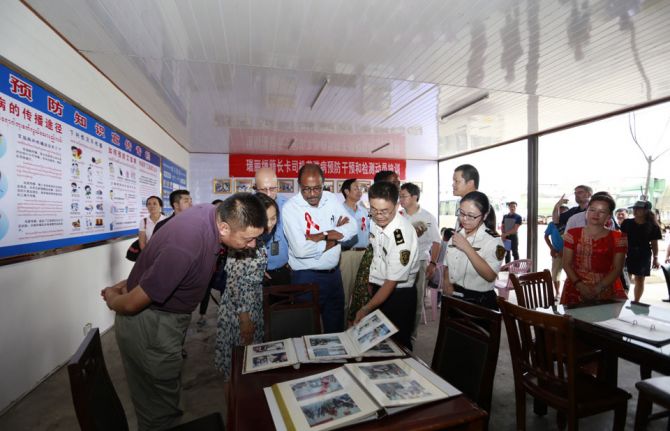
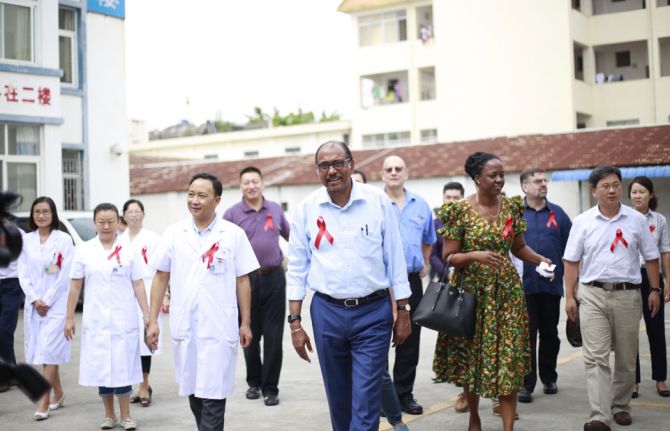
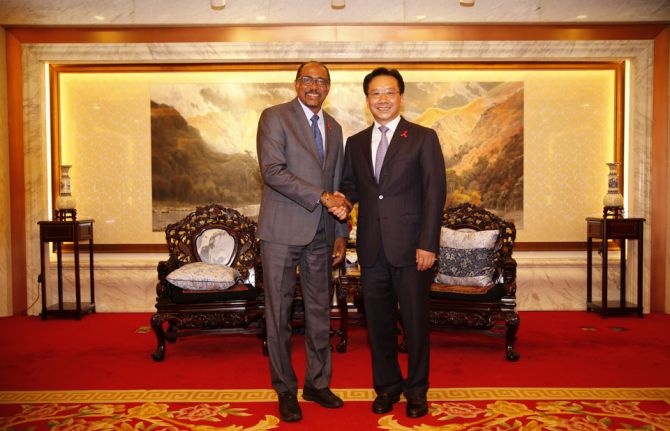
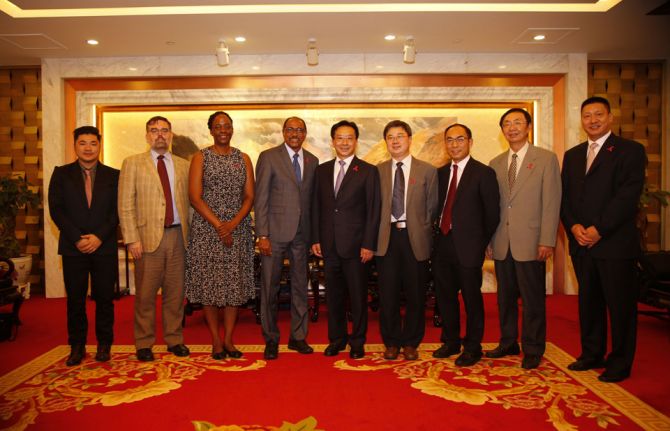
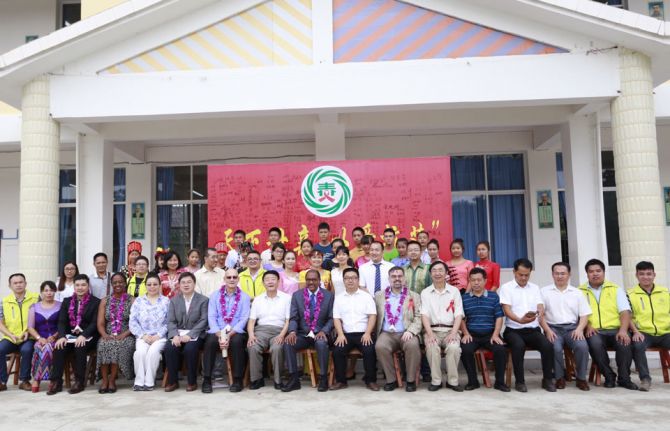
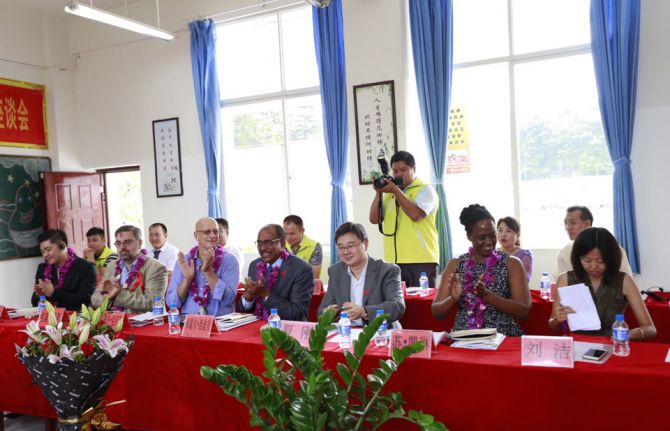
Feature Story
Dehong makes remarkable turnaround in its AIDS epidemic
12 September 2016
12 September 2016 12 September 2016The village of Jiele is where China’s first HIV cases were reported in 1989. Located in Dehong prefecture in Yunnan province, the village experienced an AIDS epidemic that resulted in almost 200 deaths. However, a quarter of a century later, the village is now brimming with hope and renewed energy.
“In the past, everyone was so scared of HIV, but now we are getting great health services and we are living normal healthy lives. We are not afraid of HIV anymore,” said a resident of Jiele.
The more than 100 people currently living with HIV in the village are receiving regular check-ups and almost all are on HIV treatment. The village’s success is echoed across Dehong prefecture, which was at the heart of China’s early AIDS epidemic.
Located near the opium producing areas of the Golden Triangle and the major drug trafficking routes, Dehong’s initial HIV cases were among people who inject drugs, as well as sex workers and their clients. In the past 15 years the prefecture has worked with community organizations, the central government and international organizations and has implemented a wide range of innovative measures, leading to a remarkable turnaround in the AIDS epidemic.
During a week-long mission to China, UNAIDS Executive Director Michel Sidibé witnessed the achievements made in Dehong. He met with officials and community groups and visited a range of sites, including Ruili Hospital on 7 September. He saw how the city hospital provides one-stop-shop HIV prevention and treatment services, including health education, HIV testing, methadone for people who inject drugs and prevention of mother-to-child transmission of HIV services.
In 2009, Dehong started to decentralize antiretroviral therapy management down to the community level for people living with HIV who had been accessing treatment for more than a year. Ruili Hospital provides assistance and technical support to the community-level antiretroviral therapy sites, which in 2014 were providing treatment to more than 600 people living with HIV.
“Ruili Hospital is a model of how one-stop-shop HIV services save lives and money,” said Mr Sidibé. “It’s remarkable how the hospital is spreading its know-how down to the community level and ensuring that quality health care is available in even the most remote corners of China.”
“The fourth round of the People’s War against AIDS has just been launched in Yunnan,” said Gao Feng, Vice-Governor of Yunnan. “We are confident we will achieve the 90–90–90 targets by 2020 in Yunnan.”
Dehong’s HIV response has evolved to meet the new challenge of providing quality health care to cross-border migrants. While in most parts of China access to key HIV services, such as treatment and methadone, require a Chinese identification card, in Dehong, HIV treatment is available to non-Chinese people who can present residence and employment permits and health certificates.
Mr Sidibé visited Jiegao, which is a district of Ruili where around 50 000 Burmese people are estimated to live. The Needle Exchange and Methadone Maintenance Treatment Extension (MMT) sites provide services to mainly migrants who inject drugs. Truck drivers crossing the China and Myanmar borders are provided with comprehensive services at a government-funded truck driver action spot. The services include health education, HIV counselling and testing, condom distribution, and referral to HIV treatment.
The local government in Dehong has a strong partnership with community-based organizations, which have played a key role in reaching migrants and people who use drugs, engage in sex work or are living with HIV.
Owing to these effective strategies, Dehong is the only prefecture in Yunnan province to receive public recognition for having reversed its AIDS epidemic. Health authorities report that HIV treatment coverage is around 60% of all people living with HIV, while prevention of mother-to-child transmission of HIV programme coverage is 100%. In Ruili, among people living with HIV eligible for antiretroviral therapy, the mortality rate has decreased by 95% compared to 2005. There were zero new HIV infections reported among people who use drugs attending MMT clinics from 2008 to 2014 and no babies born to pregnant women living with HIV have been reported to be HIV-positive since 2008. Dehong’s success is all the more remarkable as neighbouring prefectures in Yunnan province continue to experience expanding epidemics.
“Political leadership and engagement with communities and programmes based on scientific evidence can inspire other communities in China to end the AIDS epidemic,” said Mr Sidibé.
Region/country

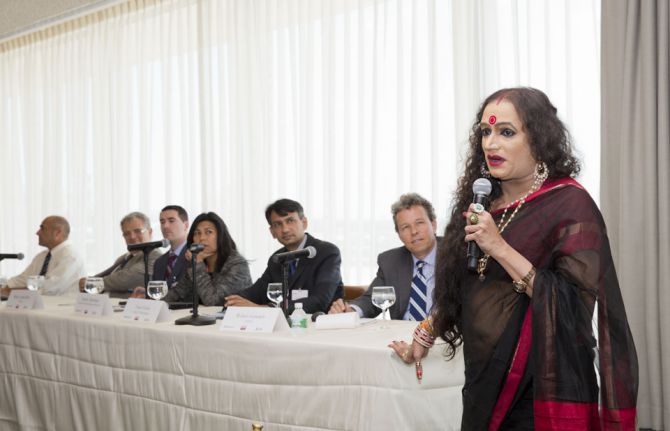
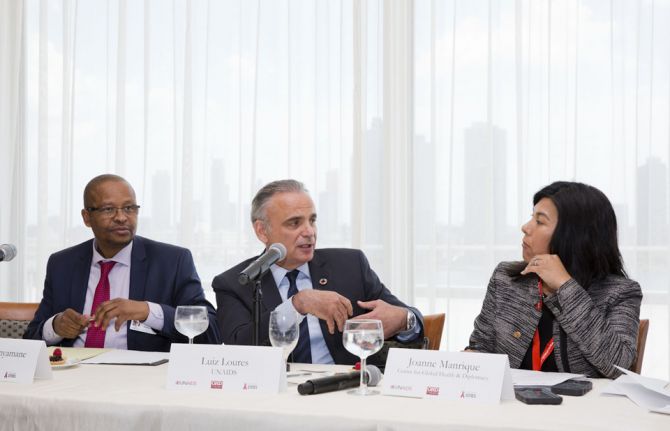
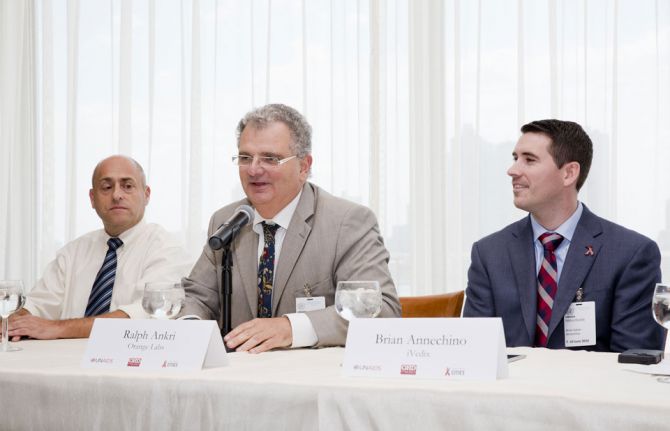
Update
City mayors, the private sector, governments and civil society share and display innovations in technology that transform the HIV response
07 June 2016
07 June 2016 07 June 2016On the eve of the United Nations General Assembly High-Level Meeting on Ending AIDS, mayors from global cities joined government representatives, the private sector and other stakeholders at the United Nations Headquarters in New York, United States of America, to discuss and showcase innovations in technology and financing for ending the AIDS epidemic by 2030.
The participants explored key challenges in city responses and offered innovative examples in information technology, mobile and data applications, pharmaceuticals, diagnostics and other scientific advancements for reaching “hard-to-reach” people with HIV prevention and treatment services. More than 20 innovators in the public, private and non-profit sectors presented their innovations in a hands-on marketplace for mayors, ministers, policy-makers and implementers. Innovations that were showcased included new cervical cancer diagnostics, smartphone applications, web-based dashboards and commodity delivery systems by drone.
Quotes
“The AIDS response can be described in two words: innovation and partnerships. Without innovation and partnerships we wouldn’t be where we are today in the AIDS response. Innovations in health allow us to democratize services and reach more people.”
“What we typically do is look to the private sector for resources, but that alone won’t cut it. We need to identify specific problems to be solved and then approach companies for direct solutions: show companies how they are the best one to solve a specific problem. A win–win situation!”
“The HIV epidemic has changed and we must change our way of communicating to people.”
“In our rural communities, accessibility is a huge challenge. Laboratories are only available in district hospitals. These new ways of delivering medications, laboratory results and other commodities are vital to keeping people with HIV alive and healthy.”
Documents
Cities ending the AIDS epidemic
05 June 2016
Cities have inherent advantages in responding to complex health problems such as HIV. They are dynamic centres of economic growth, education, innovation and positive social change. Cities have large service infrastructures and—through the power of networks—have the potential to deliver services where they are most needed, in a way that is both equitable and efficient while respecting the dignity of its citizens.


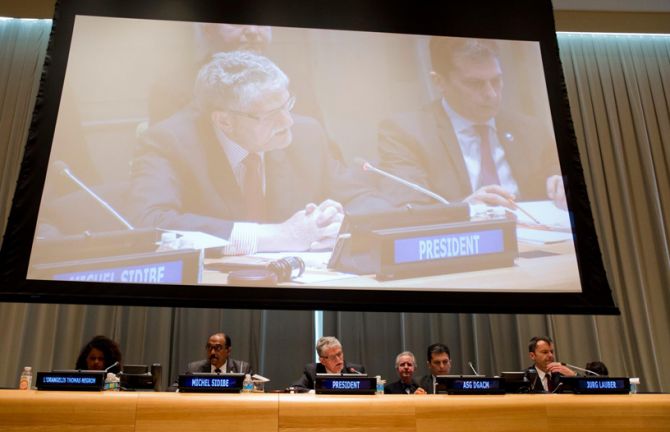
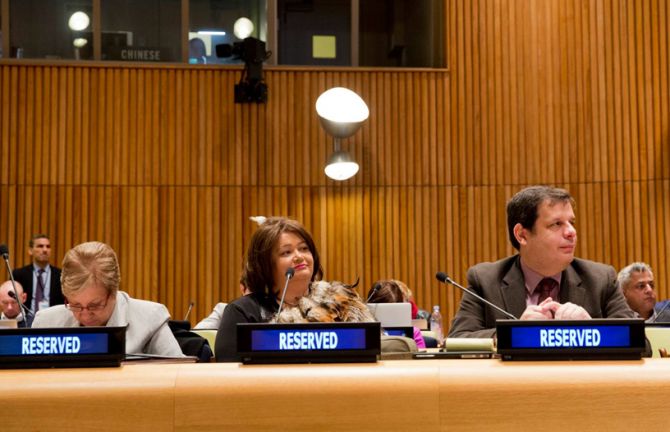

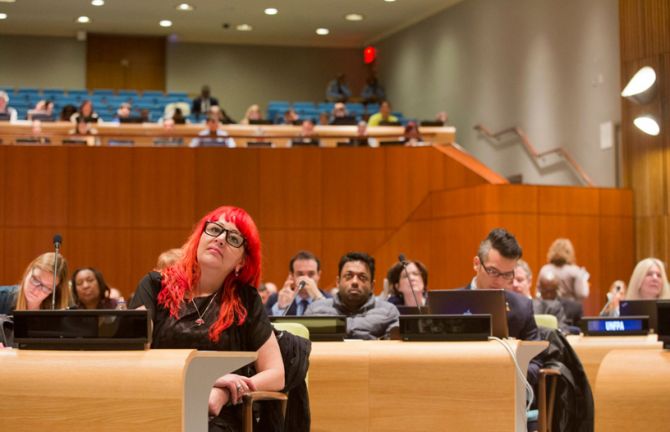
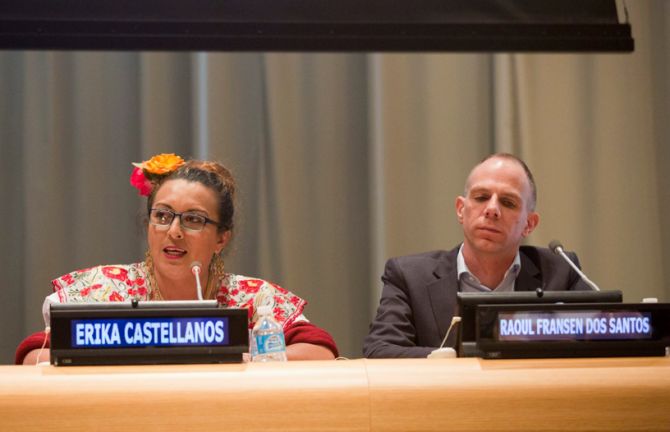
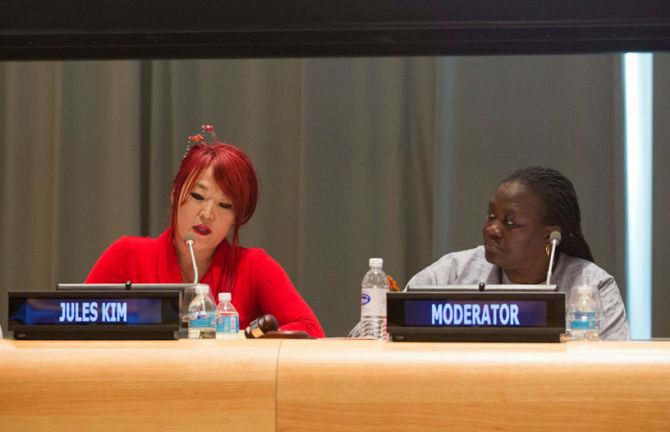
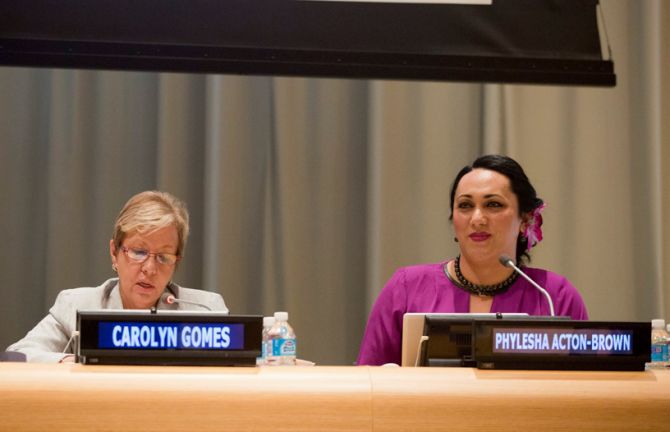

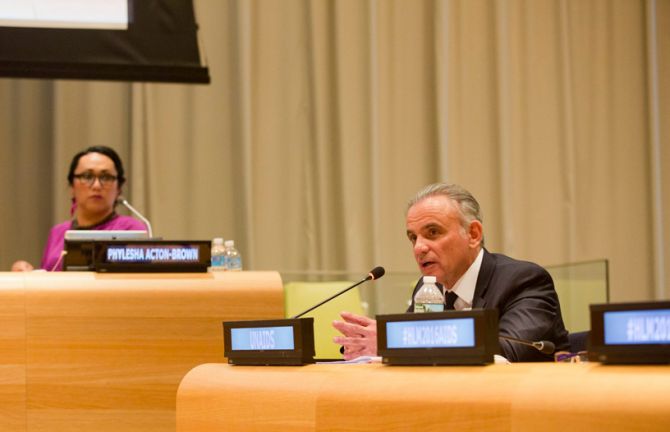

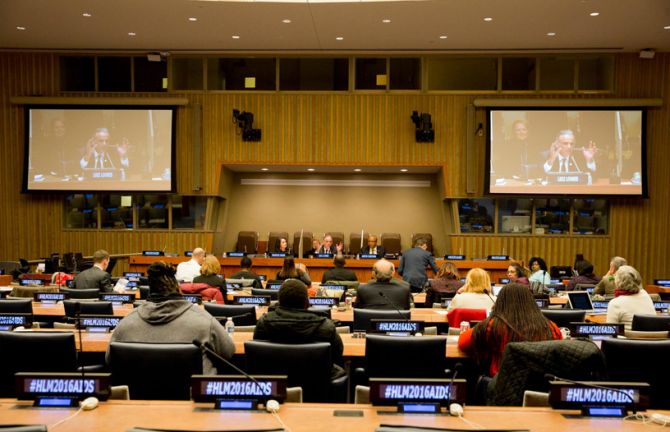
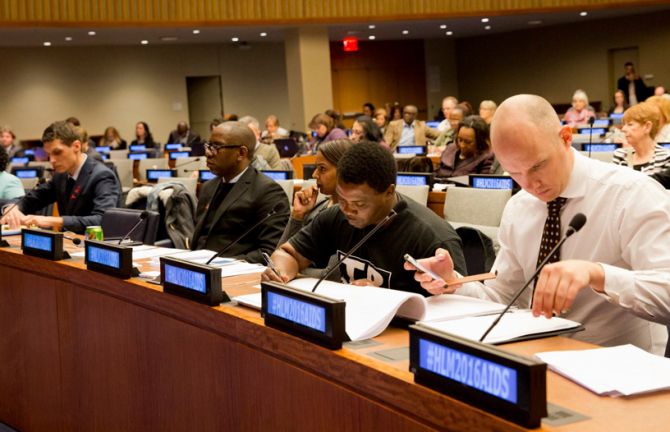
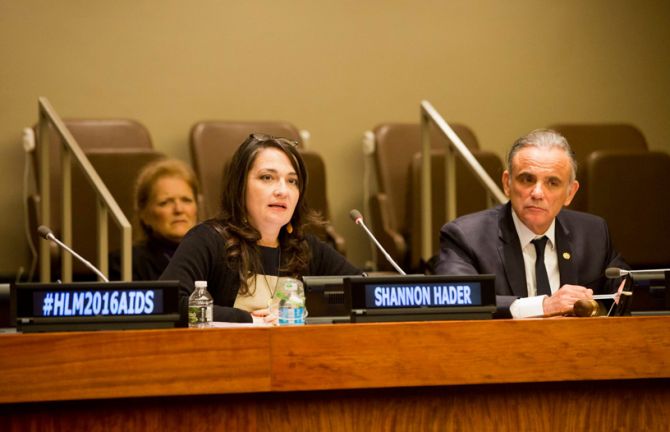

Press Release
Investing in community-led action will be critical to ending the AIDS epidemic
06 April 2016 06 April 2016Civil society urges United Nations Member States to include financing, services and rights commitments as priorities in the 2016 Political Declaration on Ending AIDS
NEW YORK, 6 April 2016—At the Informal Interactive Civil Society Hearing on HIV, civil society organizations have called on United Nations Member States and partners to ensure that the response to HIV is fully funded and that financing for community-led action is increased significantly over the next few years. They also called for 30 million people to have access to life-saving HIV treatment by 2020 and for ambitious HIV prevention targets to be met.
The hearing, convened at the United Nations Headquarters in New York, United States of America, by the President of the United Nations General Assembly, is part of the groundwork for the United Nations General Assembly High-Level Meeting on Ending AIDS, which will take place from 8 to 10 June 2016 in New York. The hearing provides an opportunity for civil society organizations to fully contribute to the preparations, to ensure that their voices are heard and that their interests are reflected, and that their recommendations are taken forward in the drafting of the new Political Declaration on Ending AIDS.
“We are aligned in our objectives of ending the AIDS epidemic by 2030,” said Mogens Lykketoft, President of the United Nations General Assembly. “Now we must work together to ensure a strong Political Declaration on Ending AIDS with clear targets that will lead the world to ending the AIDS epidemic as part of the Sustainable Development Goals.”
Representatives of civil society emphasised the need to reach the people most affected by HIV, who continue to be left behind in the AIDS response including sex workers, men who have sex with men, transgender people and people who inject drugs. The representatives also discussed the importance of ensuring a rights-based approach that is inclusive, based on evidence and people-centred during the interactive panel discussions with Member States.
“To end the AIDS epidemic, no one can be left behind,” said Michel Sidibé, Executive Director of UNAIDS. “Civil society advocacy, engagement and service delivery will play a critical role in translating the targets of the Political Declaration on Ending AIDS into real action on the ground to reach even the most marginalized people with life-saving HIV services.”
Community efforts have proven to be essential in overcoming many of the major challenges in the AIDS response, including reaching people most affected by HIV with life-changing HIV services, providing support to help people adhere to their treatment and bolstering other essential health services. Civil society engagement has also been critical in advocating for new resources, improving HIV programming and making progress on human rights issues.
“The cost of inaction is extremely high,” said Marama Pala, of the International Indigenous Working Group on HIV/AIDS and Co-Chair of the Stakeholder Task Force. “Individual communities are where the work gets done. There is no ending AIDS without us.”
UNAIDS estimates that US$ 26.2 billion will be needed for the AIDS response in low- and middle-income countries in 2020—up from the US$ 19.2 billion available in 2014. UNAIDS also underlines that greater investment in civil society advocacy and community-based service delivery will be critical.
By 2020, UNAIDS estimates that investment in community mobilization needs to increase threefold, to 3% of total HIV resources in low- and middle-income countries. Outreach to key populations in low- and middle-income countries is estimated to need to grow to about 7.2% of total HIV investments by 2020, and the estimated resource needs for community-based delivery of antiretroviral therapy need to increase to about 3.8% of total investment for HIV.
The Informal Interactive Civil Society Hearing on HIV included representatives of nongovernmental organizations, the private sector, organizations and networks representing people living with HIV, women, adolescents and young people, and other stakeholders.
UNAIDS
The Joint United Nations Programme on HIV/AIDS (UNAIDS) leads and inspires the world to achieve its shared vision of zero new HIV infections, zero discrimination and zero AIDS-related deaths. UNAIDS unites the efforts of 11 UN organizations—UNHCR, UNICEF, WFP, UNDP, UNFPA, UNODC, UN Women, ILO, UNESCO, WHO and the World Bank—and works closely with global and national partners towards ending the AIDS epidemic by 2030 as part of the Sustainable Development Goals. Learn more at unaids.org and connect with us on Facebook, Twitter, Instagram and YouTube.
Downloads
Press centre
Download the printable version (PDF)

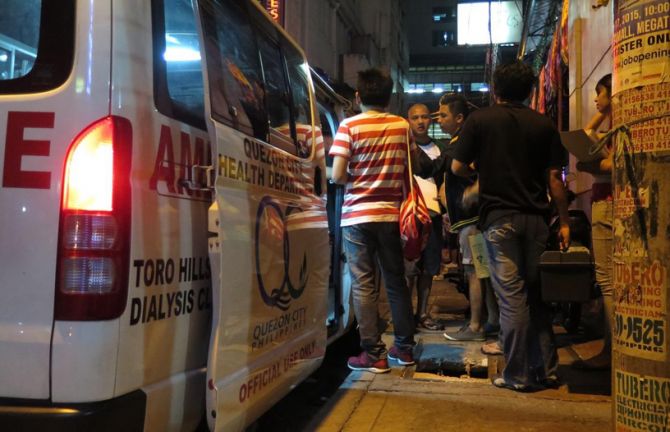
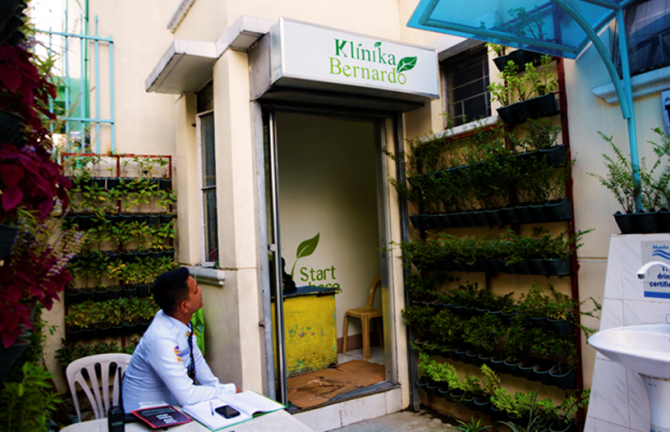
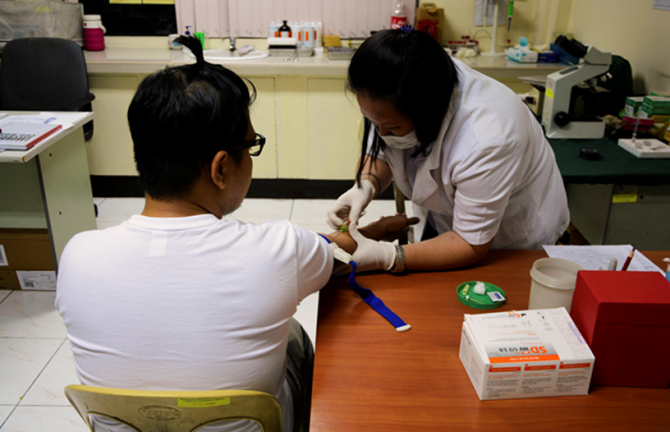
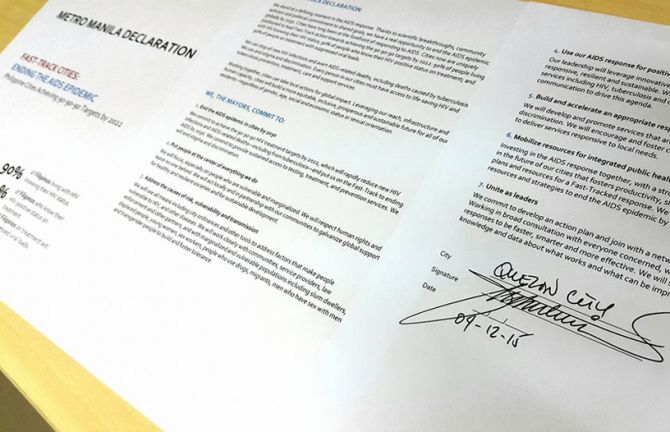
Feature Story
How Quezon City in the Philippines is turning around the AIDS epidemic
03 December 2015
03 December 2015 03 December 2015A young man wearing a striped red T-shirt and faded blue jeans enters a popular bar in downtown Quezon City, the Philippines. He starts speaking to the owner and is soon joined by several other young men. It’s 10 p.m. and the group blends in seamlessly with the other bar customers. The young men are not here to relax, though. They are peer educators and health workers employed by Quezon City’s health department.
“You just get used to it,” said Mai. “The night is to us what the day is for others. It’s the job.”
Outside, a street lamp casts an orange glow on a city ambulance that purrs softly, parked and waiting unobtrusively for clients. The group of men has come to conduct HIV counselling and testing with bar patrons and staff, who are mostly gay men or other men who have sex with men. On this steamy night they test around 50 people.
With nearly 3 million residents, Quezon City is the Philippines’ most populous urban centre and has made stopping a burgeoning AIDS epidemic a top priority.
“Quezon City is unrelenting in its effort to pursue and sustain its programme of zero new HIV infections, zero discrimination and zero AIDS-related deaths. We remain committed to providing preventive interventions, treatment, care and counselling to ensure our people receive a better quality of life,” said Mayor Herbert Bautista.
UNAIDS has encouraged cities to accelerate their AIDS response by front-loading investments and reaching critical HIV prevention and treatment targets. In the Philippines, Quezon City is leading the push to implement the UNAIDS Fast-Track Strategy in urban areas.
On 4 December, Quezon City hosted a meeting with representatives from cities in the Metro Manila area on how to end the AIDS epidemic by 2030. Participants adopted the Fast-Track approach.
UNAIDS estimates there were 6400 new HIV infections nationwide and 36 000 people living with HIV in the country in 2014. HIV prevalence among men who have sex with men was 3.3% in 2013, compared to 1.68% in 2011. Among the general population aged 15–49, the estimated HIV prevalence was lower than 0.1% in 2014.
Quezon City: a trailblazer in the country’s HIV response
While a network of facilities catering to the health needs of sex workers has existed since the 1990s in the Philippines, in 2012 Quezon City became the first city in the country to open a clinic providing services for men who have sex with men and transgender people.
Klinika Bernardo, popularly known as the Sundown Clinic, is located along a busy highway. It operates from 3 p.m. until 11 p.m., allowing a maximum number of clients to visit.
“We cater to men who have sex with men from all over the Philippines,” said Leonel John Ruiz, head physician at Klinika Bernardo. “Only 40% of our clients are from Quezon City.”
From the start, demand for services at the Sundown Clinic was high. Almost 250 HIV tests and pre- and post-test counselling services were conducted in its first two months of operation and 18 people tested HIV-positive. By the end of 2014, the clinic had conducted more than 2500 tests, of which a little more than 200 were HIV-positive. The first Sundown Clinic was so successful that the city opened a second one earlier this year.
The Sundown Clinic: a safe space for men who have sex with men and transgender people
While same-sex sexual relations are legal in the Philippines, such relationships are viewed negatively by many people and there is a high degree of stigma and discrimination towards gay men and other men who have sex with men. Fear of being outed and ostracized prevent many men who have sex with men from accessing traditional health services. Studies by city health officials show that two thirds of men who have sex with men in Quezon City have never had an HIV test.
With its row of potted plants and bright green decor, Klinika Bernardo exudes a cheerful atmosphere. It has 10 staff members, with four peer educators, who include men who have sex with men and a transgender woman. Clients can choose the educator who best suits their needs. Instead of documenting and calling clients by their name, the clinic maintains their anonymity by giving each person a number.
Staff are skilled at reassuring jittery clients.
“This is my first HIV test. I do not know what to expect,” said one young man while filling out registration forms. “I tried to read up on HIV so I would have some background information, but it took me awhile to gather the courage to come here. My partner came here with me, too, after hearing about it from our friend. We’re taking the test together.”
The young man found the staff supportive and skilled at easing his fears.
People who test HIV-positive receive counselling on antiretroviral medicines and are accompanied by staff through their initial months of HIV treatment, which is free in the Philippines.
Quezon City’s HIV programme becomes a model for other cities
Quezon City operates the Sundown clinics and has significantly increased investments in its HIV programmes in the past few years. And the city's efforts to scale up HIV testing are getting results. The number of gay men and other men who have sex with men being tested almost quadrupled between 2011 and 2014.
“In the three years that we have been operating, the perspective has definitely changed,” says Mr Ruiz. “Before, we would have a hard time inviting people for testing. Now, most of our clients are walk-ins. People are personally and actively seeking information.”
Quezon City won the prestigious Galing Pook Award for outstanding local governance in 2014 for its pioneering HIV clinics. Several other local city governments are starting to adapt the Quezon City model and establish their own clinics.
While the Sundown Clinic staff are proud of their achievements, they are looking forward to closing shop one day.
“I pray before sleeping,” says Adel, the only female peer educator at Klinika Bernardo. “I pray that there would come a day when there will be no one in need of our services. That’s what I am working for.”







